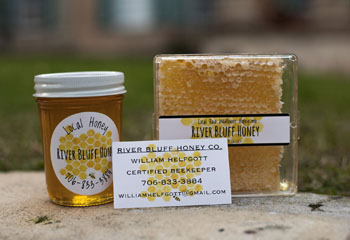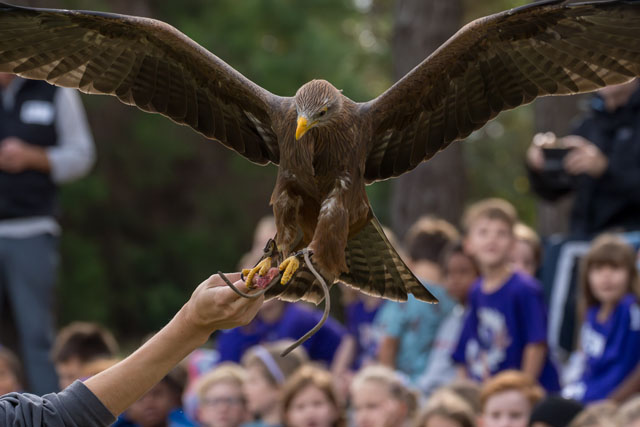The Secret Life of Bees
04 Mar 2023
Local hives are buzzing this spring
By Sharon Antonacio

What’s buzzing you ask? The answer is the lives of bees, especially in their hives during the months of March and April in the Lowcountry.
“The spring months are generally when nectar flows in the Lowcountry and where foraging worker bees (female bees other than the queen) travel to nectar-giving and pollen-giving flowers,” said Brian Fahey, a South Carolina Journeyman beekeeper and board member with the Charleston Area Beekeepers Association, a local group that supports beekeepers and provides outreach for the Lowcountry.
Fahey said bees are similar to humans in that they require both carbohydrates, the nectar; and protein, the pollen. They are also superorganisms and cannot survive alone. Each bee serves a specific purpose and is essential for the survival of the entire colony and there is an intricate division of labor in the hive, the carbohydrate-rich nectar provides all the energy and the protein builds the cells that ultimately produce more bees.
According to Fahey, “Once there are enough stores, the colony will produce one or more queen cells, which are elongated, specialized wax cells that provide enough room for the production of the larger body of a honey bee queen. The queen lays an egg in those cells, and the worker bees provide the hatched larvae with a special diet that will allow the development of a queen bee rather than a worker bee.”
The good thing for us humans is that the hive produces a surplus of honey that local beekeepers can collect while still allowing enough honey to stay in the hives for the bees to survive.
With the keeping of the hive, the beekeeper allows for that wonderful balance, keeping the hive active and the bees healthy.
As the new queens emerge, the first queen out usually stings any other queens to death. In the next few days, she then goes on to mate with at least 10 or more male bees (or drones) and stores their sperm for future use throughout the remainder of her life. After mating, she begins laying and the colony goes back to life as normal.
This is just a snapshot of what is happening inside the hives in the spring.
In addition to these bees providing us some delicious, local honey, these bees have an integral role beyond the state of South Carolina. Bees pollinate about one-third of all the produce in the world. Beekeepers help this process by traveling all over the country with hives.
From the almond growers of California, to the hobby beekeepers here in South Carolina, honeybees help immensely with the pollination of local crops and gardens.
From the delicate balance in the hive that is strictly adhered to by the queens, drones, and worker bees and their ability to pollinate crucial crops, we can see how important our role is to help the bees and the hives they live in to survive and flourish.
In return, we can benefit from the bees' hard work by using delicious local honey, beeswax, and propolis (bee glue that bees produce by mixing saliva and beeswax).
Fahey reminds us that, “local honey contains pollen of local flora, so it’s a targeted dose for fighting allergies to species in particular areas. It promotes the development of immunity to those allergens and can lessen our allergic reactions. In addition, propolis contains sap of local flora and is a natural antiseptic.”
So the next time you see your local beekeeper at the farmer’s market or store selling their honey, say, “Thank you for all you do!”
Follow The Charleston Area Beekeepers Association on Instagram and www.charlestonbees.org.
Sweet Success
College student and beekeeper starts River Bluff Honey
by Sharon Antonacio

William Helfgott is living his dreams handling honeybees and extracting the hive’s sweet local honey.
William is a sophomore at the College of Charleston and the sole proprietor of River Bluff Honey, which he began in 2017 at the young age of 15 years old.
He sells his jars of local honey and golden squares of honeycombs at Second Sunday on King Street in downtown Charleston (Every second Sunday of the month along King Street from Calhoun Street to Queen Street). Once you try a bit of honeycomb on a cheese plate, you’ll be hooked.
Helfgott’s passion started when he was eight years old. He won a raffle for a beehive through his local 4H program. His mother was instrumental in keeping the hive, but after five years of trying to keep the bees alive, they failed. In 2016, he unearthed some of the materials from keeping the hive in his garage and he asked to try again. This time his mother said it would be all him.
After one year of keeping the hive solely on his own, he found the bees produced more honey than he could keep. He promptly went to his local farmer’s market to see if shoppers and purveyors would be interested in his product, and sure enough, they were. Today, River Bluff Honey is available at 35 retailers across Georgia and South Carolina.
When asked about his key to success, Helfgott credits his mom as well as his beekeeping mentors, Allen Johnson and Deborah Sasser.
“River Bluff Honey would not be anywhere near where it is today without their guidance,” he said.
What else can we learn from the honey bee? Perhaps the idea that perseverance and working together are also keys to success. Throughout their entire life, honeybees produce about 1 teaspoon of honey, but together in the hive, honey bees produce the only food in the world that will never spoil or expire. Honey found in Egyptian tombs is still edible due to the antimicrobial/antibacterial properties.
River Bluff Honey was born out of Helfgott's desire to learn something new. Along with studying and going to classes at The College of Charleston, he is running his honey business and constantly learning new things about business here in the Lowcountry.
He has a sweetness about him, and is not only well spoken, but has a calm and friendly demeanor. This is not only good news for the honey bees he works with, but most importantly, hope for the next generation of beekeepers. Helfgott is an available resource for those looking to get into beekeeping.
Follow River Bluff Honey on Instagram @riverbluffhoney and at www.riverbluffhoney.com.
You can find River Bluff Honey at Second Sundays on King at The Boutique Charleston as well as Burbages grocery store dowtown, Blum Coffee and Chill Charleston.












